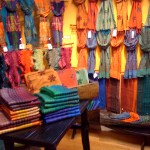 Fall is officially upon us, and what better way to celebrate the changing seasons than by stocking up on Global Exchange’s Fair Trade scarves! Whether you’re looking for cotton, silk, or wool scarves to keep you warm this fall, your local Global Exchange store is fully stocked with handmade scarves and shawls from all over the world.
Fall is officially upon us, and what better way to celebrate the changing seasons than by stocking up on Global Exchange’s Fair Trade scarves! Whether you’re looking for cotton, silk, or wool scarves to keep you warm this fall, your local Global Exchange store is fully stocked with handmade scarves and shawls from all over the world.
Our selection of 100% cotton scarves hand made in India are perfect for layering this season.
 The Sari Scarf. Made from reused cotton saris, these colorful scarves are reversible and features traditional Kantha stitching, a technique from North India. Fair Trade Federation Member Asha Imports works with a non-profit in Calcutta that trains and employs families living in slum districts to make this incredible recycled product. The manufacturing of these long 86″x8″ Sari Scarves provides a living wage for over 50 men and women in one of India’s poorest districts.
The Sari Scarf. Made from reused cotton saris, these colorful scarves are reversible and features traditional Kantha stitching, a technique from North India. Fair Trade Federation Member Asha Imports works with a non-profit in Calcutta that trains and employs families living in slum districts to make this incredible recycled product. The manufacturing of these long 86″x8″ Sari Scarves provides a living wage for over 50 men and women in one of India’s poorest districts.
 The Ayurvedic Organic Scarf. Ayur meaning “longevity” and veda meaning “knowledge,” ayurveda is a system of medicine native to India’s southern state of Kerala. The traditional medicine uses only herbal and dietary remedies, as did the production of these scarves! Dyed with organic herbs and medicinal plant extracts, the these 100% organic cotton scarves emphasize ecological and sustainable development. The Ayurvedic Scarves, produced by the Handloom Weavers Development Society in Kerala, even come with a small sachet of Ayurvedic herbs!
The Ayurvedic Organic Scarf. Ayur meaning “longevity” and veda meaning “knowledge,” ayurveda is a system of medicine native to India’s southern state of Kerala. The traditional medicine uses only herbal and dietary remedies, as did the production of these scarves! Dyed with organic herbs and medicinal plant extracts, the these 100% organic cotton scarves emphasize ecological and sustainable development. The Ayurvedic Scarves, produced by the Handloom Weavers Development Society in Kerala, even come with a small sachet of Ayurvedic herbs!
 The Mud Block Print Cotton Voile Scarf. The five-generation old family block printing business producing these colorful scarves has been widely recognized for their quality and design. The family business employs an equal number of men and women in the community to continue the ancient technique of mud block printing. Naturally dyed with indigo, pomegranate, palm sugar, and other minerals, the scarves are 100% cotton voile; voile is a light weight woven fabric that comes from the French term meaning veil.
The Mud Block Print Cotton Voile Scarf. The five-generation old family block printing business producing these colorful scarves has been widely recognized for their quality and design. The family business employs an equal number of men and women in the community to continue the ancient technique of mud block printing. Naturally dyed with indigo, pomegranate, palm sugar, and other minerals, the scarves are 100% cotton voile; voile is a light weight woven fabric that comes from the French term meaning veil.
Celebrate fall with Fair Trade scarves at all Global Exchange store locations in San Francisco, Berkeley, Portland, D.C., and Virginia and check out our entire collection of cotton, silk, and wool scarves!

